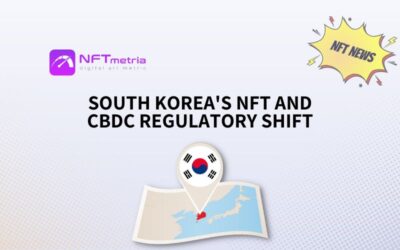In a landmark move, South Korea’s Financial Services Commission (FSC) is set to revolutionize crypto regulations. By July 2024, investors depositing digital assets on exchanges will be entitled to earn interest on their funds, marking a significant shift in the treatment of crypto assets. However, there’s a catch: non-fungible tokens (NFTs) and central bank digital currencies (CBDCs) are deliberately excluded from this regulatory paradigm.
FSC’s Directive: Interest for Crypto Depositors
The FSC’s recent notice delineates a compelling vision for the future of crypto interactions in South Korea. Investors engaging with digital assets will enter a new era where their deposits will accrue interest. This move is slated to be enforced by legislative guidance, with a target implementation date of July 2024.
Exclusion of NFTs and CBDCs: A Nuanced Approach
While the FSC’s directive promises interest earnings for most crypto assets, it makes a strategic exclusion of NFTs and CBDCs. The unique nature of these assets, characterized by non-fungibility and a different regulatory landscape, sets them apart from the broader crypto sphere. NFTs, often utilized for collectibles and ownership rather than speculative investment, are deemed unfit for interest-bearing mechanisms.
However, the regulator acknowledges potential exceptions. Even within the category of NFTs, if tokens function as a payment method and are issued in significant quantities, they might be reconsidered for inclusion in the virtual asset classification. In such cases, investors could enjoy interest benefits when depositing these tokens on exchanges.
Regulating User Deposits: Safeguarding the Crypto Space
Beyond interest mandates, the FSC is taking comprehensive steps to regulate user deposits. Exchanges are required to segregate user deposits from their own assets, entrusting them to banks. Moreover, a noteworthy 80% of the coins must be stored in cold wallets, enhancing security measures for users.
Preventing Exploits: A Focus on Security
Acknowledging the vulnerabilities of the crypto space, the FSC’s guidance extends to preparing for potential hacks or computer incidents. Virtual asset service providers are urged to sign up for insurance or accumulate reserves, fortifying the industry against unforeseen challenges. The legislation explicitly prohibits blocking deposits or withdrawals unless deemed absolutely necessary by courts and financial regulators.
This move comes as part of South Korea’s broader efforts to strengthen its regulatory stance on the crypto space. Earlier in December, financial regulators initiated a call for users to report unlicensed crypto exchanges operating within the region. This collaborative effort involved the Digital Asset Exchange Association and the Financial Intelligence Unit of South Korea.
Conclusion: A Pioneering Step Amidst Global Crypto Developments
South Korea’s exclusion of NFTs and CBDCs from the interest mandate showcases a nuanced and forward-thinking approach to crypto regulation. As the crypto landscape continues to evolve globally, this regulatory paradigm shift positions South Korea at the forefront of fostering responsible and secure crypto interactions. The anticipation is high as the industry prepares for the transformative effects of these regulatory changes. Stay tuned for further updates as South Korea pioneers this new chapter in crypto regulation.*
Subscribe to our Twitter and YouTube to stay up to date with the latest events and trends in the NFT market.











